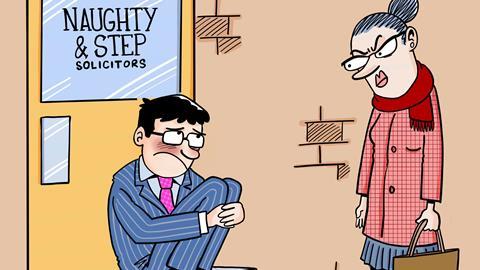Sanctioning a colleague for wrongdoing is fraught with hidden perils, especially if they are a partner. Melanie Newman asks the experts how to handle disciplinary matters
Taking disciplinary action against a fellow solicitor is nobody’s idea of fun.
But as firms in the spotlight over their handling of sexual harassment complaints have learned to their cost, getting it wrong can have unforeseen repercussions years down the line. With harassment claims rocketing and lines between work and personal life becoming increasingly blurred, knowing how to manage misconduct effectively is more important than ever.
Superficially a matter of simply following procedures, there are a surprising number of pitfalls – and law firms are as likely as other organisations to succumb.
‘Preconceived ideas about the outcome are very common,’ says Robert Forman of Murdochs Solicitors. In his experience of advising solicitors, decisions can be driven by commercial interest. ‘For example: “This person’s a good fee-earner, so we have to keep him or her.” Or conversely: “We don’t want this person, here’s an excuse to get rid of them.”’
If evidence of this attitude comes to light later – during an unfair dismissal claim for example – it may be used to argue that the disciplinary process was unfair.
If you take a lenient approach to misconduct with one person because they’re of commercial interest to the firm, don’t be surprised when someone else expects the same treatment
Robert Forman, Murdochs
‘If you take a lenient approach to misconduct with one person because they’re of commercial interest to the firm, do not be surprised when someone else expects the same treatment,’ Forman warns. ‘If you don’t act consistently they’ll want to know why. They might suggest you’re discriminating against them, victimising them.’
Firms may try to use disciplinary procedures to remove ‘problematic individuals’, he adds – sometimes coupled with a threat to report them to the Solicitors Regulation Authority.
‘The lawyer may be told: “This has come to our attention – it’s serious, you can either resign now or face gross misconduct proceedings and a report to the SRA.’ Taking calls from distressed solicitors, I regularly hear this, and it’s wrong at every level.’
Such ultimatums, even if couched cleverly, can amount to constructive dismissal, Forman explains.
The decision on whether to report a matter to the SRA should be taken independently of the disciplinary process, he adds. ‘Disciplinary proceedings should never be linked to SRA reports.’
Firms are obliged to report serious misconduct to the SRA and offering not to report an individual if they resign can in itself be an offence punishable by the regulator.
Earlier this year the regulator issued a warning notice about covering up misconduct with non-disclosure clauses in settlement agreements. A Baker McKenzie associate who complained of sexual assault had been asked to sign a non-disclosure agreement before leaving the firm, prompting the notice. That matter came to light years later. Anonymous accounts in response to media reports of this case suggested other firms had taken similar action.

TO REPORT MISCONDUCT
Outcome 10.4 of the Solicitors Regulation Authority’s Code of Conduct says serious misconduct must be reported – but gives no guidance on what constitutes this, or when in the investigation or disciplinary process the report should be made.
The SRA’s discussions with lawyers show practitioners differ in their understanding of when they should report.
‘Some suggest that the obligation to report only arises once they have determined within the firm that regulatory misconduct has indeed occurred. Others believe that they should report any potential breach much earlier,’ the SRA says.
As a result, the regulator intends to clarify the rules on when and how to report misconduct and is currently consulting on the process.
In the meantime, Matthew Purcell of Saunders Law (pictured) advises erring on the side of disclosure to the SRA – and the firm’s insurers – earlier rather than later, if in doubt about when to report.
‘There is ordinarily a period of evidence-gathering after the first suspicion of misconduct emerges so one doesn’t want to be too knee-jerk about reporting,’ he says.
‘On the other hand, no one will be annoyed if you make an early report on something that smells like serious misconduct, whereas if you do nothing you could be accused of covering up or worse.’
The firm’s Compliance Officer for Legal Practice is ‘the central guiding light’ and likely to be involved in any disciplinary involving a partner, he adds. Insurers will also need to know of any misconduct likely to affect the firm’s business.
Policies and procedures
As ever in employment matters, following the firm’s policies and procedures is key. Which procedure to use will depend on the legal status of the lawyer under scrutiny.
While the Advisory, Conciliation and Arbitration Service sets out employee entitlements during the disciplinary process, equity partners may not have the same protection. The process and entitlements will differ; the LLP deed might allow immediate dismissal of a partner who has been found guilty of a particular type of misconduct, for example.
Having worked out which procedure is appropriate, the next thing to do is establish whether misconduct has occurred, or whether further investigation is required before the allegation is put to the individual.
Theoretically, suspension is a neutral act: letters asking employees to stay at home usually state that. But that is not how it is seen in practice
Matthew Grant, Martin Searle Soliciors
‘Look at the facts and don’t make assumptions,’ says Matthew Grant of Martin Searle Solicitors. ‘We often get employers who see a potentially troubling email or document, and jump to conclusions – that the employee is planning to leave for a competitor, for example, or that they’ve done something wrong and are trying to cover up.’
The employer may need to look through emails, messages and client files. External technical support may be required.
Once that is done and it seems likely misconduct has occurred, Grant says his client’s instincts are often to suspend the individual.
‘Wanting to keep the employee out of the way is understandable, but there’s a lot of case law now saying suspension shouldn’t be done at the first whiff of misconduct, or in a knee-jerk way. My feeling is, it often isn’t necessary.’
Theoretically, suspension is a neutral act: letters asking employees to stay at home usually state that. But that is not how it is perceived in practice. ‘If a solicitor is suddenly unavailable, it’s inevitable clients are going to want to know why. Lawyers aren’t able to lie and say that the person is unwell, so it can have a reputational impact,’ Grant says.
‘It’s also a big knock to the individual’s confidence. Employees have told me they feel as though the writing’s on the wall. It’s a big cause of stress.’
Suspension of an employee without proper grounds can be a breach of the implied term of trust and confidence, which may prompt the employee to resign and claim constructive dismissal. That is exactly what happened in a recent High Court case, Agoreyo v London Borough of Lambeth [ 2017] EWHC 2019 (QB). A school had suspended a teacher for using ‘excessive force’ without considering alternatives to suspension or whether it was necessary to ensure a fair investigation. In other cases, such as Gogay v Hertfordshire County Council [2000 IRLR 703] CA, employees have succeeded in personal injury claims where they were suspended based on mere allegations, or where suspensions were allowed to continue for an unreasonable period of time.
‘Be cautious,’ Grant advises. ‘Think about what you need to do to protect the investigation.’ Ask a lawyer who usually works from home to come into the office, he suggests – or vice versa. ‘You could change their software privileges or their access to client monies.’
Conduct or capability?
Do not be tempted to confuse performance and disciplinary issues, warns Michael Burd of Lewis Silkin. Capability should be dealt with via a different procedure, which in all but the most gross incompetence cases provides for the lawyer to be given the opportunity to improve.
‘Employers find dealing with sustained capability problems very difficult, because the procedure requires you to live with the deficiencies for a while before you can dismiss,’ Burd says. To get around this they sometimes start the disciplinary process instead and then use this to attempt to negotiate an exit. Employees faced with disciplinary action commonly file grievances, forcing the employer to decide whether to put the disciplinary on hold while the grievance is dealt with, or combine the two processes.
‘It’s tricky and there’s no set rule,’ Burd says. ‘If there’s a significant overlap in the subject matter you can combine them to save time. The same person can hear both.’
For example, the employee might claim that they are being discriminated against and that the unfounded, unfair disciplinary process is a manifestation of this: ‘In that situation it almost always makes sense to combine the two.’

GETTING PERSONAL
Whether infractions in one’s personal life constitute a disciplinary offence in the context of work depends on the nature of the conduct and the role of the individual, says Kingsley Napley’s Kirsty Churm (pictured).
At one end of the scale are serious criminal offences that may affect a lawyer’s ability to practise as well as the firm’s reputation. At the other end is an expanding ‘grey area’, where the lines between personal and work life are blurred and case law is less clear. Social media has complicated the issue.
A partner in a Yorkshire law firm was suspended from practising in August for posting offensive, anti-religious Twitter messages from an account that identified her as a solicitor.
But personal messages and accounts may also attract censure.
‘We’ve been involved in cases where individuals have made what they thought were private Facebook comments and they’ve come into the public domain and that’s led to a finding of misconduct,’ says Churm.
The law is grappling with the nexus between individual rights to beliefs and freedom to express their opinions, and employers’ desire for staff to be on-message.
‘Whether an opinion expressed on social media can be considered misconduct depends on a number of factors, including what the opinion is and whether it’s protected under discrimination legislation,’ Churm explains.
Belief, including non-religious belief, she notes, is a protected characteristic.
‘For example, if you were a staunch believer in republicanism and were tweeting about that, you’d have an argument for saying that’s a belief protected under the Equality Act. The employer would be wise to consider the discrimination aspect in any disciplinary process.’
But it is a mistake to use the same person to oversee the investigation and to make the decision on sanctions, says Kate Boguslawska of Carter Lemon Camerons. ‘Firms will also need to keep someone in reserve to handle any appeal.’ Small firms might need to hire in an HR consultant to conduct all or part of the process, she adds.
After gathering the evidence, the lawyer concerned is sent a ‘disciplinary invitation’ setting out the misconduct they are accused of and the evidence against them, and inviting them to attend a hearing. The letter should also inform them of potential sanctions, Boguslawska adds, and if they are an employee rather than a partner, that they can bring a colleague or trade union representative to the meeting.
Because any witness evidence needs to be disclosed to the individual at this stage, people are sometimes reluctant to cooperate. According to Boguslawska, it is common for potential witnesses to fear repercussions of giving evidence against someone senior.
‘If a witness wants to remain anonymous, you have to respect that,’ she says. Statements provided to the accused lawyer might need to be redacted.
Another tricky situation arises when the complainant and accused person provide conflicting evidence in the absence of other witnesses. This is often the case in sexual harassment and sex discrimination cases. ‘The employer has to decide who is more convincing, but it may not be possible to decide, so you get an inconclusive result,’ Boguslawska says. ‘The complainant wouldn’t usually be satisfied with this, but the employer has to be fair towards both individuals. They can’t choose who to support.’
If a witness wants to remain anonymous, you have to respect that
Kate Boguslawska, Carter Lemon Camerons
In these cases, the employee often resigns and sometimes brings a case for constructive dismissal, she adds. ‘It’s a situation where very little can be done, except work out steps to avoid ensuring the same thing happening again. This should be through reviewing and updating policies and proper staff training.’
Where misconduct has been found, the employer may use a range of sanctions ranging from a verbal warning to dismissal.
The biggest mistake employers tend to make at this stage is failing to reason their decisions adequately, says Kirsty Churm of Kingsley Napley.
‘You need to take all the information given, including mitigating circumstances, into account, and you need to document that process. The letter you send should set out how the decision has been reached and give the person the right of appeal.’
Where partners’ roles are on the line it is very important to check the LLP deed, she adds. ‘For example, the decision to expel might need to be taken by a vote of the other partners.’
Melanie Newman is a freelance journalist
































1 Reader's comment